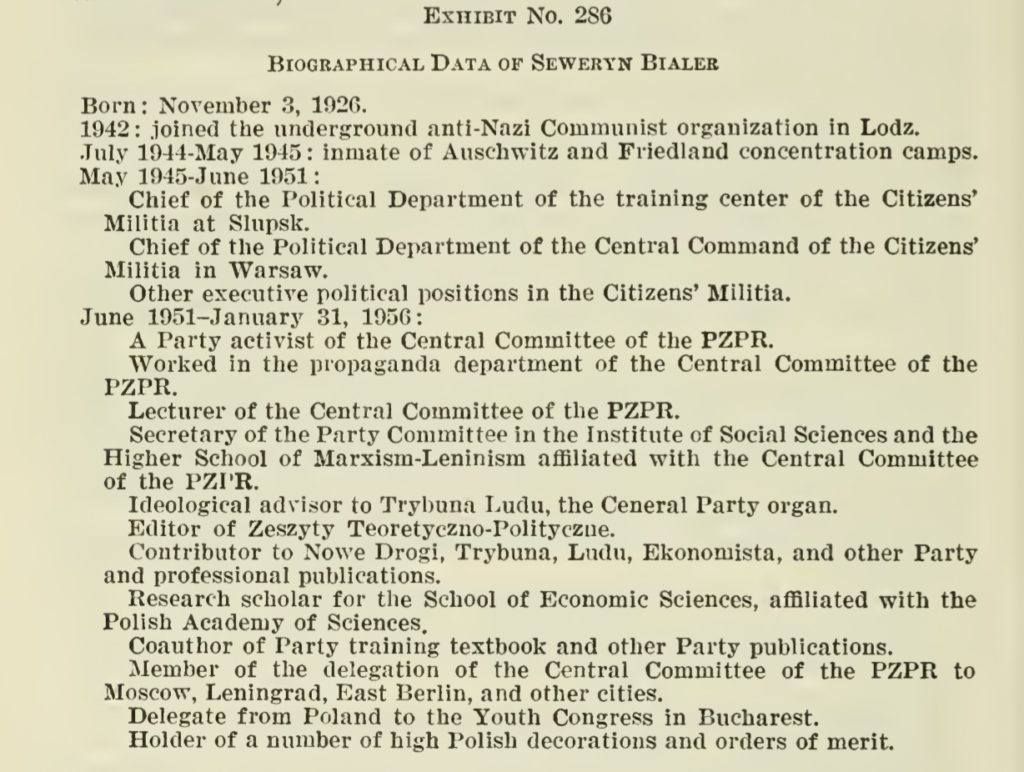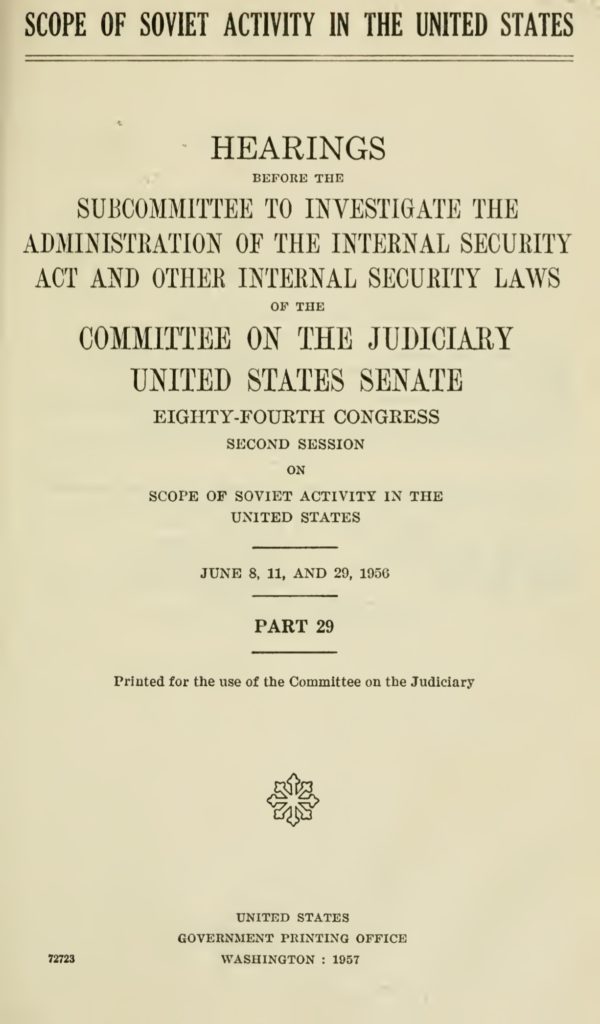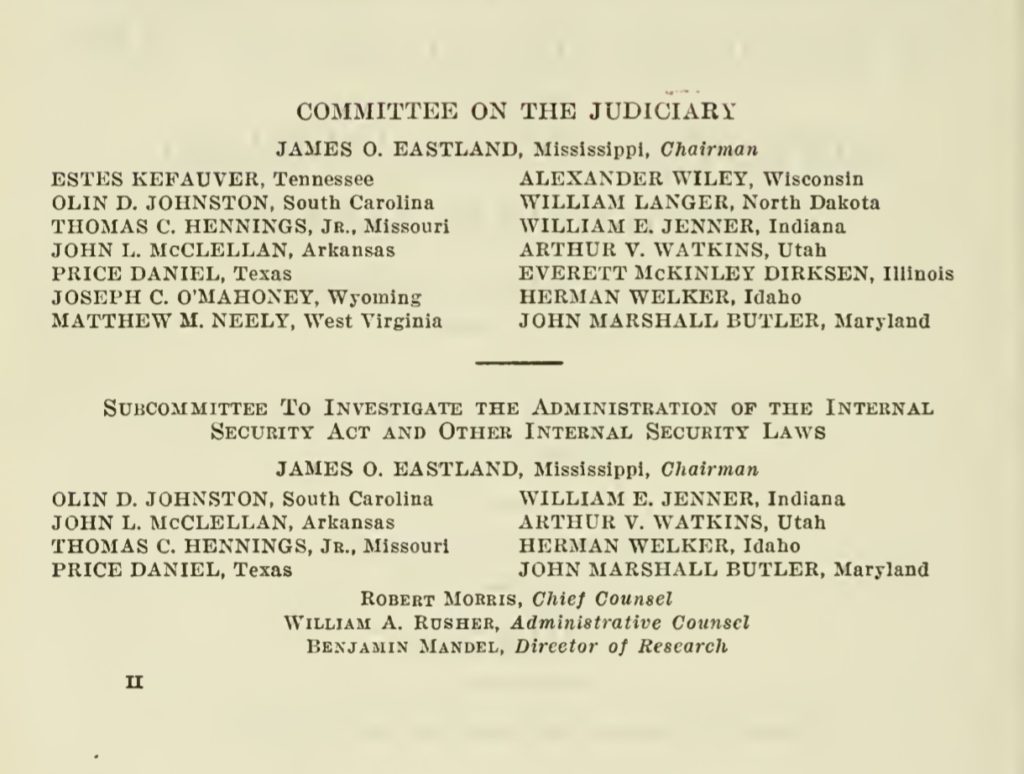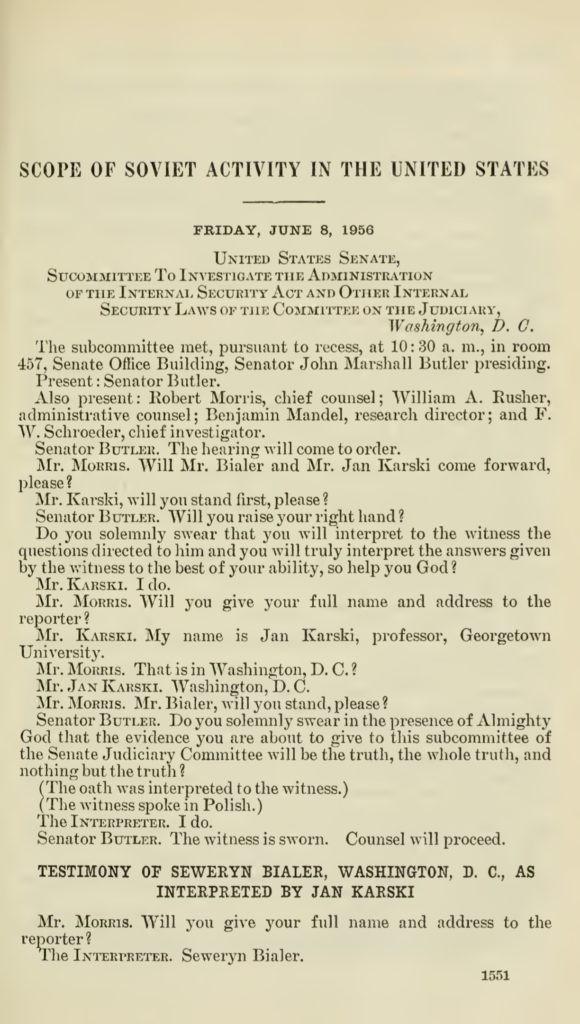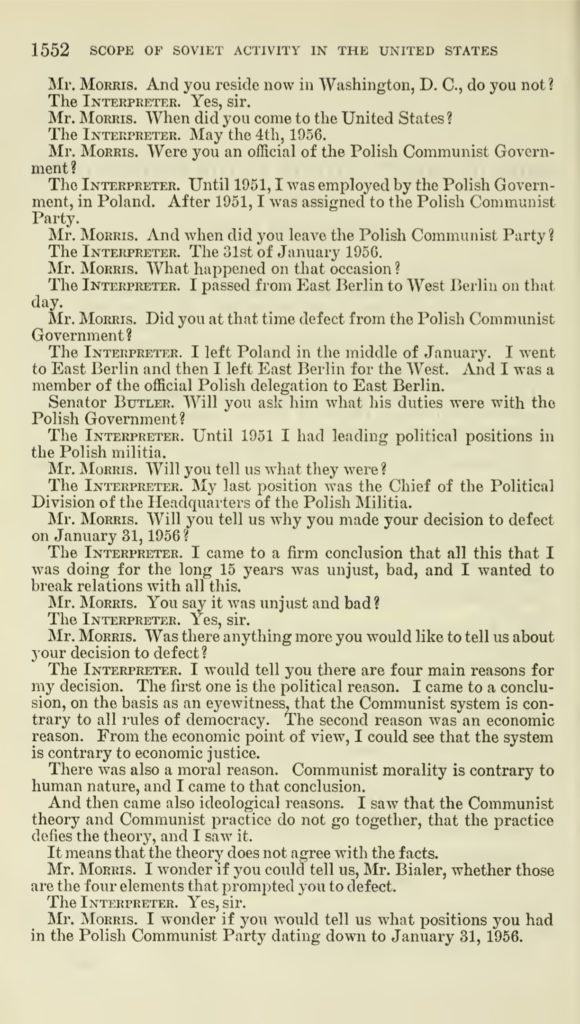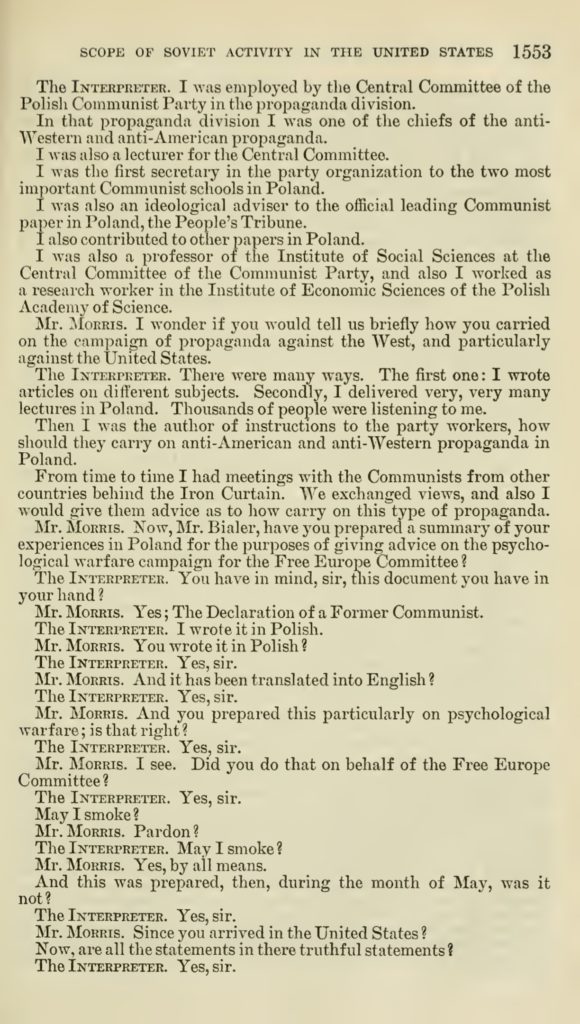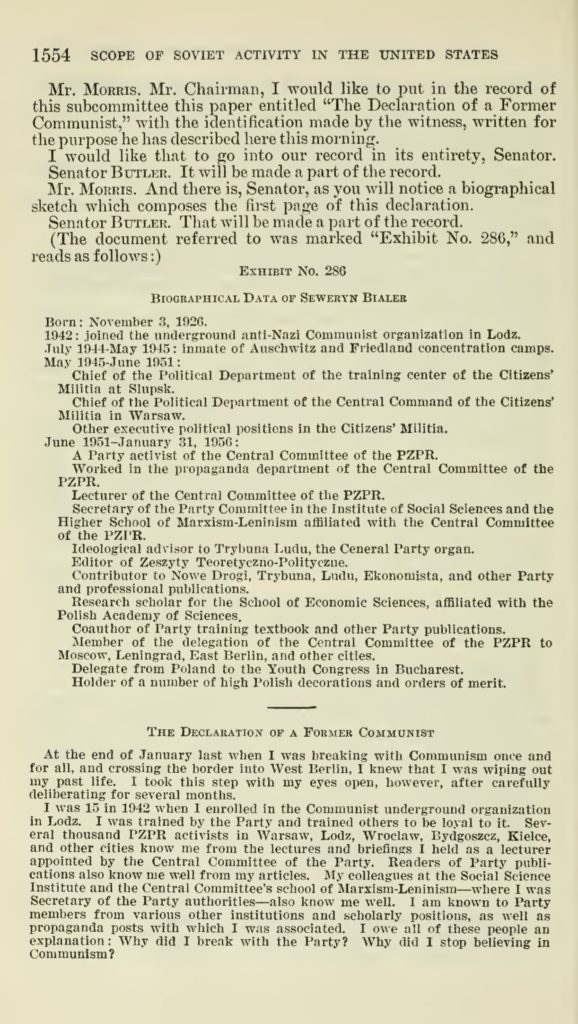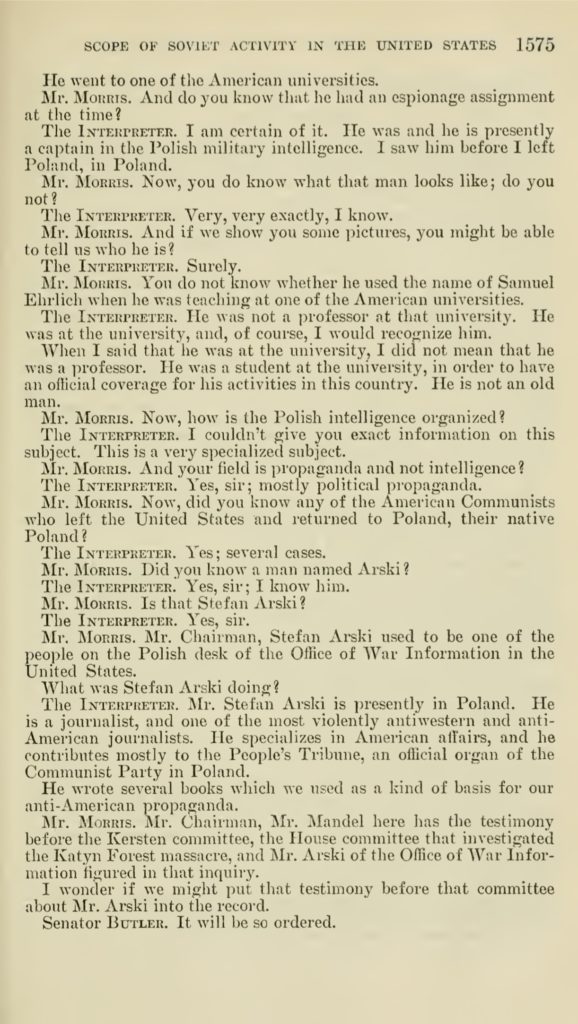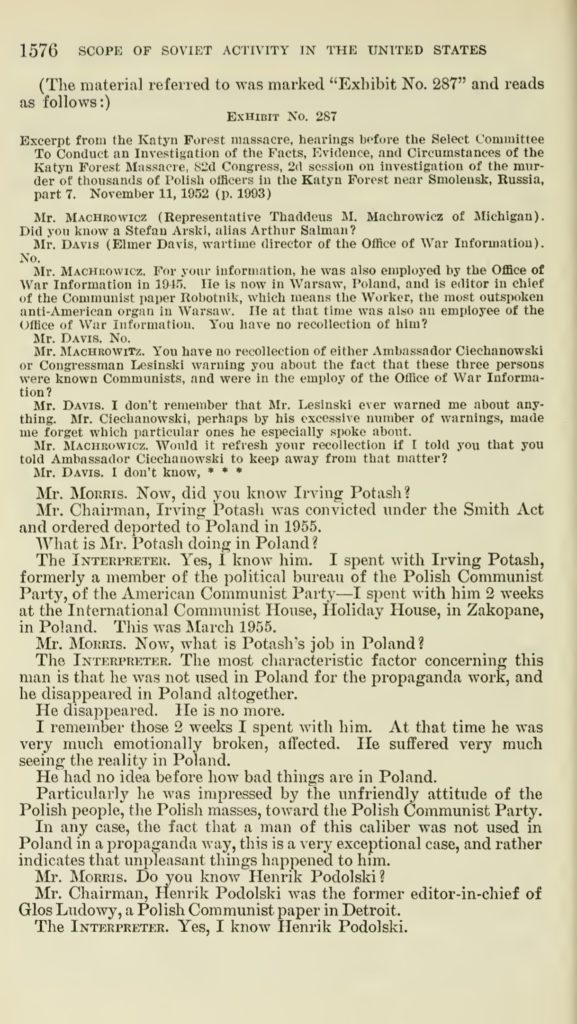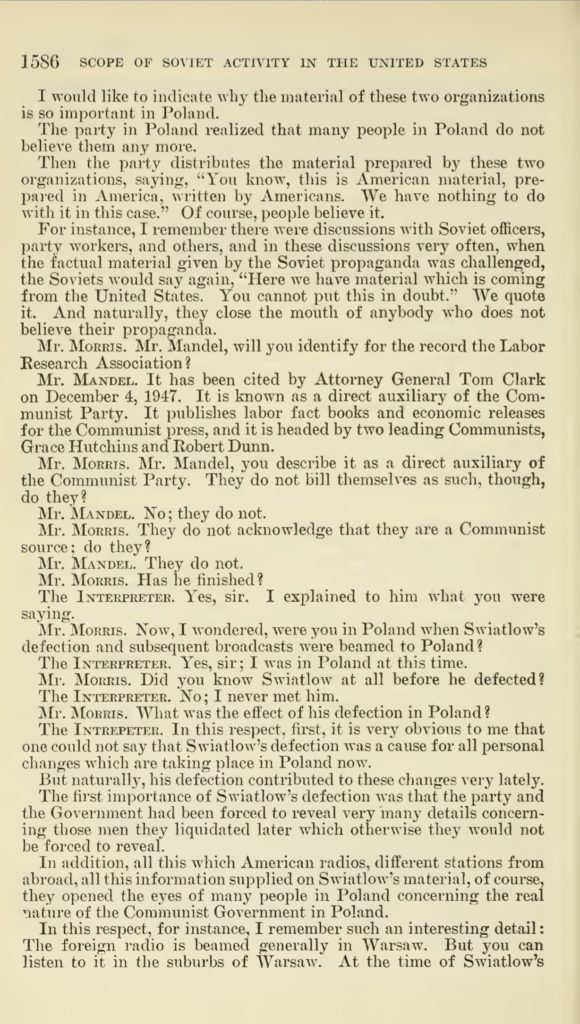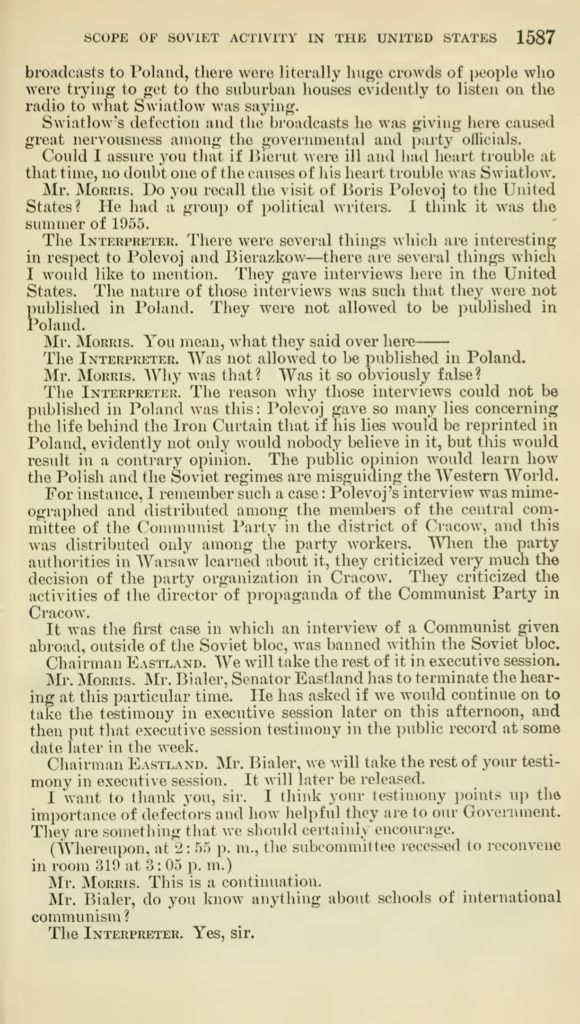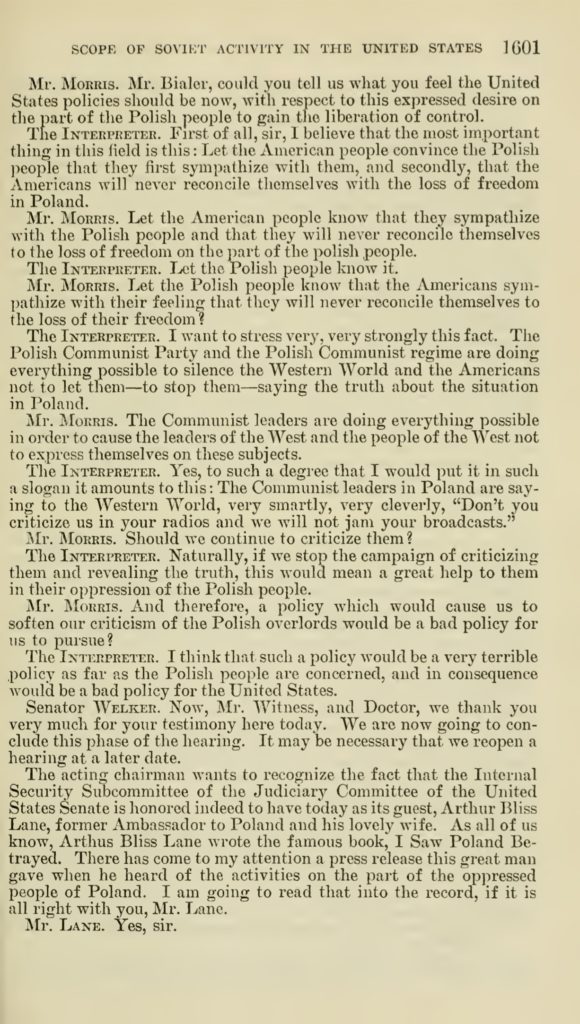By Ted Lipien for Cold War Radio Museum
Two extraordinary refugees from Poland helped to expose in 1956 to the U.S. Congress anti-U.S. propaganda activities of a communist journalist Stefan Arski, also known as Artur Salman.
He had worked on World War II radio broadcasts which later became known as the Voice of America (VOA).[ref]Almost all writers of Voice of America history, as well as former and current VOA and U.S. State Department officials and former United States Information Agency (USIA) public diplomacy experts, agree that VOA started within the Office of War Information (OWI) in 1942 with the first radio broadcast to Germany even though initially and for the first few years it did not use the full “Voice of America” name. One public diplomacy expert, insists, however, that the radio broadcasting unit within the OWI should not be called the Voice of America because it had different names and a different mission from the one established after VOA was moved to the State Department in 1945 and to the USIA in 1953. This writer disagrees with this conclusion. While there were personnel cuts in 1945, some of the former pro-Soviet VOA broadcasters and some of VOA’s managers continued their radio work within the State Department for several more years before they were replaced. The Voice of America continued to cover up Stalin’s crimes or to ignore them for several more years after the war. The same criticism of OWI-VOA pro-Soviet foreign and domestic propaganda continued after the war and contributed to the passage of the 1948 Smith-Mundt Act. One expert disagrees that OWI’s and VOA’s pro-Soviet domestic propaganda played a role in the enactment of the Smith-Mundt Act which restricted the distribution of VOA programs in the United States. This writer maintains that the fear of Soviet agents of influence and of Soviet propaganda being forced upon Americans by the Voice of America and other agencies of the Executive Branch played a major role in congressional debates, starting in about 1942, and contributed to the Smith-Mundt Act becoming U.S. law. Many former and current VOA officials have been either unaware of these facts or tried to hide them to perpetuate a dangerous myth that the Voice of America should not be overly scrutinized and managed by the U.S. Congress or any U.S. administration because its journalists and officials have always been totally committed to broadcasting truthful news and can do no wrong. Media outreach abroad in countering Russian and other hostile foreign propaganda is needed and can be effective in some cases, but this writer believes that any U.S. Executive Branch effort to propagandize to Americans in the United States carries enormous risks, as does ineffective management of U.S. government media outreach abroad. [/ref]
Born in Poland before the war, Arski was one of many foreign and American Communists in the U.S. Office of War Information (OWI) radio unit managed by pro-Soviet officials who approved and encouraged spreading of Soviet propaganda. Another fellow traveler, the chief writer of “Voice of America” news for the OWI, was future Communist Party member and the 1953 winner of the Stalin Peace Prize (worth about $235,000 in today’s dollars), American writer and journalist Howard Fast.[ref]Ted Lipien, “Stalin Prize-winning Chief Writer of Voice of America News, Cold War Radio Museum, March 12, 2019, http://www.coldwarradiomuseum.com/stalin-prize-winning-former-chief-writer-of-voice-of-america-news/.[/ref] Their boss, described later as the first VOA Director, was future Oscar-winning Hollywood actor John Houseman who was forced to resign in 1943 when the State Department refused to issue him a U.S. passport because of his suspected pro-Soviet and pro-Communist sympathies and hiring of Communists to produce radio programs.[ref]Ted Lipien, “First VOA Director was a pro-Soviet Communist sympathizer, State Dept. warned FDR White House,” Cold War Radio Museum, May 5, 2018, http://www.coldwarradiomuseum.com/state-department-warned-fdr-white-house-first-voice-of-america-director-was-hiring-communists/.[/ref] Fast sought and received Russia news from the Soviet Embassy in Washington. His and Houseman’s bosses in the OWI, Joseph Barnes and Robert E. Sherwood, were also Soviet sympathizers. After their forced departure as a result of pro-communist broadcasts condemned by, among others, General Dwight D. Eisenhower, Sherwood secretly continued to coordinate propaganda for Voice of America with the help of the Soviet Embassy in London. Their top boss, OWI Director Elmer Davis, wrote and voiced programs in support of perhaps the greatest Soviet propaganda lie of the 20th century–the false Soviet claim of innocence in the mass murder of thousands of Polish prisoners of war. Stefan Arski was thus only one of many less known OWI Communists and pro-Soviet broadcasters who prepared the Voice of America radio programs in English and in various foreign languages, including Polish. Some of them continued in their Voice of America jobs in the State Department for a few more years after the war.[ref]Epstein, Julius. Congressional Record: Proceedings and Debates of the 81st Congress, Second Session, Appendix. Part 17 ed. Vol. 96. August 4, 1950, to September 22, 1950. Washington, DC: United States Government Printing Office, 1950, A5744-A5745. See: Cold War Radio Museum, ‘Love for Stalin’ at wartime Voice of America, October 6, 2016, http://www.coldwarradiomuseum.com/love-for-stalin-at-wartime-voice-of-america/ .[/ref]By 1956, however, almost all of them had left or retired from their U.S. government employment, but the Soviet Union and other communist states continued to spread their propaganda in the West with the help of their agents of influence and some of the poorly-informed Western media.
One of the refugees from Communism who after the war tried to educate Americans about the work of pro-Kremlin propagandists in the United States and in Poland was Seweryn Bialer, himself an ex-Communist who after his defection to the West became later a respected scholar and professor of Soviet studies at Columbia University. When Prof. Bialer died on February 8, 2019 in New York City at the age of 92, conservative American opinion magazine National Review noted in reporting his death that “From men such as Professor Bialer, we learned a lot, because they had, the hard way.”[ref]National Review, “The Week,” Volume LXXI, No. 5, March 25, 2019, 12.[/ref] Bialer was initially a Communist who became an anti-Communist. After he defected to the West in January 1956, Bialer recorded a series of interviews in Polish with Radio Free Europe (RFE), in which he described the corruption, crimes and propaganda techniques of the communist regime in Warsaw.
In testimony in June 1956 before a U.S. Senate subcommittee, Bialer exposed to Americans pro-Soviet communist influence over the early U.S. government radio broadcasts to Europe and ongoing Cold War anti-American propaganda activities behind the Iron Curtain and in the United States. He was helped by his interpreter, another famous refugee, Jan Karski, himself always an anti-Communist and a former fighter in the Polish underground anti-Nazi resistance movement. In 2012, President Barak Obama posthumously awarded Karski, who died in 2000 in Washington, D.C., with the country’s highest civilian honor, the Presidential Medal of Freedom, for his World War II efforts to save Jews from the Nazi-German Holocaust. 1982, Israel’s Yad Vashem recognised Jan Karski as Righteous Among the Nations.
Both Bialer and Karski understood the dangers of Communist propaganda and tried to protect the Voice of America from again falling under the influence of Soviet sympathizers and communist agents, as it did during World War II.
Bialer told the Senate subcommittee in 1956 that “The Communist leaders in Poland are saying to the Western World, very smartly, very cleverly, ‘Don’t you criticize us in your radios and we will not jam your broadcasts.'”
In an answer to a question from the subcommittee’s Chief Counsel Robert Morris whether Western radios, which included U.S.-funded Radio Free Europe and the U.S. government-managed Voice of America, should continue to criticize the communist regimes, Seweryn Bialer said through his interpreter Jan Karski:
The INTERPRETER [JAN KARSI for SEWERYN BIALER]. Naturally, if we stop the campaign of criticizing them and revealing the truth, this would mean a great help to them in their oppression of the Polish people.
Seweryn Bialer was a Jewish Holocaust survivor. Jan Karski witnessed the Holocaust and unsuccessfully tried to convince British Prime Minister Winston Churchill and U.S. President Franklin D. Roosevelt to take stronger direct measures to stop Hitler from killing millions of Jews. Bialer was born in Berlin to a prominent Jewish family, lived in Łódź, Poland before and during the war and was active in the anti-Nazi Polish underground resistance. He was arrested by the Germans and was a prisoner in Auschwitz. After the war, he joined the Communist Party, worked on its police force in Poland and became a member of the Party’s Central Committee. He broke with Communism and defected to the West in January 1956. Karski, born to a prominent Roman Catholic family, was during the war a courier of the Polish underground state who at a great risk to himself went to the Warsaw Ghetto to get a first-hand look at the Nazi atrocities against the Jews and later traveled from Nazi-occupied Poland to Great Britain and the United States to warn the Western leaders about the Holocaust. Both Bialer and Karski became notable professors of political science and history at American universities. Karski was a professor at Georgetown University in Washington, D.C.
Bialer, who while working for the communist regime in Warsaw specialized in ideological warfare, revealed in his U.S. Senate investigative committee testimony that Stefan Arski, a key anti-American propagandist in communist-ruled Poland, was a former World War II Polish Desk journalist of the U.S. Office of War Information (OWI) producing radio broadcasts later known as the Voice of America. Bialer described Arski as one of the most violently anti-western and anti-American journalists in communist-ruled Poland. Bialer also revealed the work of Soviet communist propagandists sent to the United States as agents of influence. He told the Senate subcommittee that some of the lies these Soviet political writers told the American media about the life behind the Iron Curtain were so outlandish that that the Polish Communist Party banned the re-publishing of their American interviews in Poland to avoid being ridiculed by the Poles who lived under Communism and its collapsing socialist economy. The propaganda of the Soviet agents of influence was reserved for naive American journalists and their media outlets.
The INTERPRETER [JAN KARSKI for SEWERYN BIALER]. The reason why those interviews could not be published in Poland was this: Polevoj [Soviet Communist writer] gave so many lies concerning the life behind the Iron Curtain that if his lies would be reprinted in Poland, evidently not only would nobody believe in it, but this would result in a contrary opinion.
Bialer noted that “it was the first case in which an interview of a Communist given abroad, outside of the Soviet bloc, was banned within the Soviet bloc.” Bialer’s Senate subcommittee testimony coincided with the June 1956 Polish workers’ uprising in protest against misearable living conditions, price increases and lack of freedom under communist rule.
The information about Stefan Arski’s activities in the United States during the war while working for the OWI was already revealed a few years earlier by the bipartisan Madden Committee of the House of Representatives which investigated the 1940 Soviet massacre of thousands of Polish military officers at the Katyn Forest near Smolensk, Russia–a genocidal communist crime which the Soviet propaganda with initial help from the Voice of America tried to blame on the Germans. The committee, named after its chairman, Rep. Ray Madden (D-IN), condemned in 1951-1952 domestic and foreign pro-Soviet propaganda activities of the OWI’s World War II radio division and declared post-war Voice of America radio broadcasts, then managed by the State Department, as timid and ineffective against Soviet disinformation.[ref]The bipartisan Select Committee to Conduct an Investigation and Study of the Facts, Evidence and Circumstances of the Katyn Forest Massacre, also known as the Madden Committee, said in its final report issued in December 1952: “In submitting this final report to the House of Representatives, this committee has come to the conclusion that in those fateful days nearing the end of the Second World War there unfortunately existed in high governmental and military circles a strange psychosis that military necessity required the sacrifice of loyal allies and our own principles in order to keep Soviet Russia from making a separate peace with the Nazis.” The committee added: “For reasons less clear to this committee, this psychosis continued even after the conclusion of the war. Most of the witnesses testified that had they known then what they now know about Soviet Russia, they probably would not have pursued the course they did. It is undoubtedly true that hindsight is much easier to follow than foresight, but it is equally true that much of the material which this committee unearthed was or could have been available to those responsible for our foreign policy as early as 1942.” The Madden Committee also said in its final report in 1952: “This committee believes that if the Voice of America is to justify its existence, it must utilize material made available more forcefully and effectively.” A major change in VOA programs occurred, with much more reporting being done on the investigation into the Katyń massacre and other Soviet atrocities, but later some of the censorship returned. Radio Free Europe (RFE), also funded and indirectly managed by the U.S., never resorted to such censorship, and provided full coverage of all communist human rights abuses. See: Select Committee to Conduct an Investigation and Study of the Facts, Evidence and Circumstances of the Katyn Forest Massacre, The Katyn Forest Massacre: Final Report (Washington: United States Government Printing Office, 1952), 10-12. The report is posted on the National Archives website: https://archive.org/details/KatynForestMassacreFinalReport.[/ref]
In his 1956 testimony to a Senate subcommittee, Bialer gave several examples of Stefan Arski’s post-war anti-American propaganda activities in Poland. Bialer’s testimony was translated for the subcommittee by Jan Karski.[ref]Scope of Soviet activity in the United States. Hearing before the Subcommittee to Investigate the Administration of the Internal Security Act and Other Internal Security Laws of the Committee on the Judiciary, United States Senate, Eighty-fourth Congress, second session (Eighty-fifth Congress, first session), https://ia802205.us.archive.org/30/items/scopeofsovietact2730unit/scopeofsovietact2730unit.pdf.[/ref]
Between February 1944 and May 1945, Seweryn Bialer was a prisoner in the Auschwitz concentration camp before he joined the communist regime in Poland after the war. Shortly after his defection to West Berlin, Bialer participated in numerous interview sessions for Radio Free Europe and Radio Liberty, which were broadcast to Poland in 1956. He later received a Ph.D.degree in political science from Columbia University and was appointed Robert and Renee Belfer Professor of Political Science. He became a well-regarded expert on the Communist parties of the Soviet Union and Poland. In 1983 he was awarded a prestigious MacArthur Fellowship.[ref]But even Prof. Bialer overestimated the power of communism. It was reported that in May 1981, after President Reagan at Notre Dame University dismissed communism as “a sad, bizarre chapter in human history whose last pages are even now being written,” Prof. Bialer confidently contradicted Reagan in Foreign Affairs: “The Soviet Union is not now nor will it be during the next decade in the throes of a true systemic crisis, for it boasts enormous unused reserves of political and social stability that suffice to endure the deepest difficulties.” See: Steele, David Ramsey (1992). From Marx to Mises: Post Capitalist Society and the Challenge of Ecomic Calculation. Open Court. ISBN 9780875484495. Some Poles never forgave Prof. Bialer for his earlier association with the communist regime in Poland. But in his 1956 interviews with Radio Free Europe and his Senate testimony he provided valuable information on a number of Poles who during World War II had lived in the United States and engaged in pro-Soviet activities, and after the war were working for the communist authorities in Warsaw, including Stefan Arski. Bialer also broke with and strongly denounced Communism.[/ref]
“Mr. Morris.[Robert Morris, Chief Counsel] And your field is propaganda and not intelligence?
The Interpreter.[Jan Karski interpreting for Seweryn Bialer] Yes, sir; mostly political propaganda.
Mr. Morris. Now, did you know any of the American Communists who left the United States and returned to Poland, their native Poland?
The Interpreter. Yes; several cases.
Mr. Morris. Did you know a man named Arski?
The Interpreter. Yes, sir; I know him.
Mr. Morris. Is that Stefan Arski ?
The Interpreter. Yes, sir.
Mr. Morris. Mr. Chairman, Stefan Arski used to be one of the people on the Polish desk of the Office of War Information in the United States. What was Stefan Arski doing?
The Interpreter. Mr. Stefan Arski is presently in Poland. He is a journalist, and one of the most violently anti-western and anti-American journalists. He specializes in American affairs, and he contributes mostly to the People’s Tribune, an official organ of the Communist Party in Poland. He wrote several books which we used as a kind of basis for our anti-American propaganda.
Mr. Morris. Mr. Chairman, Mr. Mandel here has the testimony before the Kersten committee, the House committee that investigated the Katyn Forest massacre, and Mr. Arski of the Office of War Information figured in that inquiry. I wonder if we might put that testimony before that committee about Mr. Arski into the record.
Senator Butler. It will be so ordered. (The material referred to was marked “Exhibit No. 287” and reads as follows:)
Exhibit No. 287 Excerpt from the Katyn Forest massacre, hearings before the Select Committee To Conduct an Investigation of the Facts, Evidence, and Circumstances of the Katyn Forest Massacre, 82nd Congress, 2d session on investigation of the murder of thousands of Polish officers in the Katyn Forest near Smolensk, Russia, part 7. November 11, 1952 (p. 1993)
Mr. Machrowicz (Representative Thaddeus M. Machrowicz of Michigan). Did you know a Stefan Arski, alias Arthur Salman?
Mr. Davis (Elmer Davis, wartime director of the Office of War Information). No.
Mr. Machrowicz. For your information, he was also employed by the Office of War Information in 1945. He is now in Warsaw, Poland, and is editor in chief of the Communist paper Robotnik, which means the Worker, the most outspoken anti-American organ in Warsaw. He at that time was also an employee of the Office of War Information. You have no recollection of him?
Mr. Davis. No.
Mr. Machrowicz. You have no recollection of either Ambassador Ciechanowski or Congressman Lesinski warning you about the fact that these three persons were known Communists, and were in the employ of the Office of War Information?
Mr. Davis. I don’t remember that Mr. Lesinski ever warned me about anything. Mr. Ciechanowski, perhaps by his excessive number of warnings, made me forget which particular ones he especially spoke about.
Mr. Machrowicz. Would it refresh your recollection if I told you that you told Ambassador Ciechanowski to keep away from that matter?
Mr. Davis. I don’t know, …”
The head of OWI’s Czechoslovak Desk, Dr. Adolf Hofmeister, was also a Communist sympathizer who later served the Soviet-dominated regime in Prague as their ambassador to Paris and in other posts. He later broke ranks with the Communist Party, but after a stay in the West, returned to Communist-ruled Czechoslovakia. OWI’s chief Elmer Davis admitted knowing Dr. Hofmeister, but he claimed that he did not know Stefan Arski, alias Artur Salman, who had worked for him during the war at OWI’s Polish Desk.
OWI CEO Elmer Davis was highly dismissive of the late Congressman John Lesinski, Sr. (D-MI) and former Polish Ambassador to Washington during World War II, Jan Ciechanowski, who represented the Polish government in exile in London.
Elmer Davis admitted that Adolf Hofmeister became after the war the Ambassador to France of the Czechoslovak Communist regime, but he stated that “he showed no signs of that inclination [being a Communist supporter] while he was with us that I ever heard of.” Mr. Davis also said that “we found about a dozen [Communist sympathizers], and I fired them.”
But even without such pro-Communist propagandists as Arski and Hofmeister writing scripts for the Voice of America, the Roosevelt White House would have gotten VOA to carry its preferred propaganda message. The Office of War Information Director Elmer Davis, before the war a reporter and editorial writer for The New York Times and subsequently a popular CBS radio news presenter prior to being hired to run the OWI, wrote a commentary for VOA and for distribution to U.S. domestic media in which he squarely put the blame for the Katyn Massacre on the Nazis, even though he was well aware of significant evidence of Soviet guilt. One such Elmer Davis radio commentary was aired abroad in OWI’s Voice of America broadcasts on May 3, 1943, but he was already denying Soviet guilt over Katyn and spreading Soviet propaganda in April 1943 through both VOA and U.S. domestic radio networks.
Communists at OWI-VOA
Helping to generate a pro-Soviet propaganda message were scores of WWII Voice of America broadcasters (the Office of War Information external radio broadcasting unit was not officially known as “Voice of America” until a few years later), some of whom were dedicated pro-Kremlin Communists who were already long gone when Senator Joseph McCarthy launched his crusade to root out Soviet sympathizers but ended up hurting innocent individuals and damaging U.S. government’s reputation in the early 1950s. It was a different story during the war. In addition to Stefan Arski, who later went back to communist-ruled Poland and became the regime’s chief anti-U.S. propagandist denying the Soviet responsibility for the Katyn massacre, the Office of War Information employed many other pro-Soviet Voice of America broadcasters and propagandists who were either members of the Communist Party or strong Soviet sympathizers. No longer with OWI, which was disbanded in 1945, nor with the Voice of America which continued its operations within the State Department with the same but reduced staff, Stefan Arski was still in the United States in 1947 as a correspondent for the Warsaw Socialist newspaper Robotnik. In 1947, the Washington Embassy of the Polish Communist Government published Arski’s advocacy book, “The New Polish-German Border: Safeguard of Peace.”
Arski is identified in the book as having “served in the Office of War Information in the United States during the war.”[ref]Stefan Arski, “The New Polish-German Border: Safeguard of Peace,” Polish Embassy, Washington, D.C., 1947, p. 64.[/ref] Shortly after his book was published, Arski returned to Poland. In a 1952 article in the Polish Communist Party daily Trybuna Ludu, titled “Propaganda of Genocide’s Perpetrators,” this former VOA wartime commentator called the activities of the U.S. congressional commission investigating the Katyn Massacre “a gross provocation” equal to the original provocation of the Nazi Minister of Propaganda Joseph Goebbels.[ref] Stefan Arski, “Propaganda ludobójców,” Trybuna Ludu, 1952, nr. 61.[/ref]
In his article, Stefan Arski condemned the Voice of America coverage of the Katyn hearings. In another article, he described Radio Free Europe as being created by “the flower of America’s dark reactionary forces, fascism, and imperialist domination.”[ref]Stefan Arski, “Uwaga! Radiodywersja!,” Warszawa, 1953, p. 25.[/ref] He was no doubt a talented propagandist of his time whether he worked on World War II Voice of America programs or for the communist regime in Warsaw after the war. A February 14, 1952 Incoming Telegram No. 533 from Warsaw, Poland to the Secretary of State regarding an article in Życie Warszawy offers another typical example of anti-U.S. propaganda in Polish communist media. While it is not clear from the U.S. Embassy cable whether the Życie Warszawy article was written by Arski, it closely resembles his style of anti-American propaganda.
Seweryn Bialer received praise from the Senate subcommittee chair on that day, Senator John Marshall Butler (R-MD), for breaking with Communism and becoming a defector.
Senator BUTLER. Yes. We will adjourn now and recess until Monday.
I would like to say this for the record, that the testimony of Mr. Bialer this morning, with its importance to the work of the Internal Security Subcommittee and the understanding of recent world events, indicates the groat usefulness of defectors. This testimony shows very convincingly that there are important people behind the Iron Curtain who want to join the free world. When these people come over to us, they bring important intelligence information.
In this way, we can learn the real meaning of the Communist strategy of world conquest.
But more important, their defection impresses on the world the great vulnerability of the Communist world—the fact that these people are kept in bondage. All our agencies as well as the Congress should do everything possible to encourage more defections.
I want to thank you, Mr. Bialer, for coming here. We will stand in recess until Monday morning.
Seweryn Bialer returned to testify before the Senate subcommittee on June 11, 1956 and discussed the activities of Polish and American Communists, some of whom ended up in Poland after the war. Bialer explained how communist media in Poland helped to produce anti-American propaganda, often using pro-Soviet American sources.
In his June 11 testimony, Bialer also discussed the earlier defection of Polish secret police official Józef Światło. In the Senate subcommittee transcript, Światło’s name is misspelled as Swiatlow. After his defection to the West, Światło was extensively interviewed by the Polish Service of the Voice of America, which no longer employed Soviet sympathizers and already had such distinguished anti-Communist journalists as Zofia Korbońska.[ref]As late as 1951, the Voice of America, which was at that time located in New York but managed from Washington by the State Department, while usually less jammed than RFE, was under heavily criticism in the United States, particularly from Republicans in the U.S. Congress, for failing to counter Soviet propaganda. Voice of America listeners in communist ruled Poland, in letters smuggled to the United States described VOA programs as “uninteresting, drab, bureaucratic in tone, unconvincing.” See: Ted Lipien, “1953 CIA Source: People Died in Czechoslovakia Because of Pro-Communist Propaganda from Voice of America,” Cold War Radio Museum, January 4, 2019, http://www.coldwarradiomuseum.com/listening-to-western-broadcasts-in-communist-ruled-czechoslovakia/.[/ref] Światło was also extensively interviewed by the Polish Service of Radio Free Europe, which was never tainted by Soviet propaganda.
[SEWERYN BIALER THROUGH HIS INTERPRETER DR. JAN KARSKI] I would like to indicate why the material of these two organizations is so important in Poland.
The party in Poland realized that many people in Poland do not believe them any more.
Then the party distributes the material prepared by these two organizations, saying, ” You know, this is American material, prepared in America, written by Americans. We have nothing to do with it in this case.” Of course, people believe it.
For instance, I remember there were discussions with Soviet officers, party workers, and others, and in these discussions very often, when the factual material given by the Soviet propaganda was challenged, the Soviets would say again, “Here we have material which is coming from the United States. You cannot put this in doubt.” W e quote it. And naturally, they close the mouth of anybody who does not believe their propaganda.
Mr. MORRIS. Mr. Mandel, will you identify for the record the Labor Research Association?
Mr. MANDEL. It has been cited by Attorney General Tom Clark on December 4, 1947. It is known as a direct auxiliary of the Communist Party. It publishes labor fact books and economic releases for the Communist press, and it is headed by two leading Communists, Grace Hutchins and Robert Dunn.
Mr. MORRIS. Mr. Mandel, you describe it as a direct auxiliary of the Communist Party. They do not bill themselves as such, though, do they?
Mr. MANDEL. No; they do not.
Mr. MORRIS. They do not acknowledge that they are a Communist source: do they?
Mr. MANDEL. They do not.
Mr. MORRIS. Has he finished?
The INTERPRETER. Yes, sir. I explained to him what you were saying.
Mr. MORRIS. Now, I wondered, were you in Poland when Swiatlow’s
defection and subsequent broadcasts were beamed to Poland?
The INTERPRETER. Yes, sir; I was in Poland at this time.
Mr. MORRIS. Did you know Swiatlow [correct spelling is Światło] at all before he defected?
The INTERPRETER. No; I never met him.
Mr. MORRIS. What was the effect of his defection in Poland?
The INTREPETER. In this respect, first, it is very obvious to me that one could not say that Swiatlow’s defection was a cause for all personal changes which are taking place in Poland now. But naturally, his defection contributed to these changes very lately. The first importance of Swiatlow’s defection was that the party and the Government had been forced to reveal very many details concerning those men they liquidated later which otherwise they would not be forced to reveal. In addition, all this which American radios, different stations from abroad, all this information supplied on Swiatlow’s material, of course, they opened the eyes of many people in Poland concerning the real nature of the Communist Government in Poland. In this respect, for instance, I remember such an interesting detail: The foreign radio is beamed generally [sic. The witness meant the radio signals were generally jammed] in Warsaw. But you can listen to it in the suburbs of Warsaw. At the time of Swiatlow’s broadcasts to Poland, there were literally huge crowds of people who were trying to get to tho suburban houses evidently to listen on the radio to what Swiatlow was saying. Swiatlow’s defection and the broadcasts he was giving here caused great nervousness among the governmental and party officials. Could I assure you that if Bierut were ill and had heart trouble at that time, no doubt one of the causes of his heart trouble was Swiatlow.
Mr. MORRIS. DO you recall the visit of Boris Polevoj to the United States? He had a group of political writers. I think it was the summer of 1955.
The INTERPRETER. There were several things which are interesting in respect to Polevoj and Biorazkow—there are several things which I would like to mention. They gave interviews here in the United States. The nature of those interviews was such that they were not published in Poland. They were not allowed to be published in Poland.
Mr. MORRIS. You mean, what they said over here.
The INTERPRETER. Was not allowed to be published in Poland.
Mr. MORRIS. Why was that? Was it so obviously false?
The INTERPRETER. The reason why those interviews could not be published in Poland was this: Polevoj gave so many lies concerning the life behind the Iron Curtain that if his lies would be reprinted in Poland, evidently not only would nobody believe in it, but this would result in a contrary opinion. The public opinion would learn how tho Polish and the Soviet regimes are misguiding the Western world. For instance, I remember such a case: Polevoj’s interview was mimeographed and distributed among the members of the central committee, of the Communist Party in the district of Cracow, and this was distributed only among the party workers. When the party authorities in Warsaw learned about it, they criticized very much the decision of the party organization in Cracow. They criticized the activities of the director of propaganda of the Communist Party in Cracow. It was the first case in which an interview of a Communist given abroad, outside of the Soviet bloc, was banned within the Soviet bloc.
Chairman EASTLAND. We will take the rest of it in executive session.
Mr. MORRIS. Mr. Bialer, Senator Eastland has to terminate tho hearing at this particular time. He has asked if we would continue on to take the testimony in executive session later on this afternoon, and then put that executive session testimony in the public record at some date later in the week.
Chairman EASTLAND. Mr. Bialer, we will take the rest of your testimony in executive session. It will later be released. I want to thank you, sir. I think your testimony points up the importance of defectors and how helpful they are to our Government. They are something that we should certainly encourage. (Whereupon, at 2: 55 p. in., the subcommittee recessed to reconvene in room 319 at 3: 05 p. m.)
Mr. MORRIS. This is a continuation. Mr. Bialer, do you know anything about schools of international communism?
The INTERPRETER. Yes, sir.
In his testimony on June 29, Seweryn Bialer told the Senate subcommittee that the United States should not fall for communist propaganda that they would stop jamming Radio Free Europe and the Voice of America if these American radio stations would only stop criticizing the communist leaders in Poland.
Mr. MORRIS. Mr. Bialer, could you toll us what you feel the United States policies should be now, with respect to this expressed desire on the part of the Polish people to gain the liberation of control.
The INTERPRETER. First of all, sir, I believe that the most important thing in this field is this: Let the American people convince the Polish people that they first sympathize with them, and secondly, that the Americans will never reconcile themselves with the loss of freedom in Poland.
Mr. MORRIS. Let the American people know that they sympathize with the Polish people and that they will never reconcile themselves to the loss of freedom on the part of the polish people.
The INTERPRETER. Let the Polish people know it.
Mr. MORRIS. Let the Polish people know that the Americans sympathize with their feeling that, they will never reconcile themselves to the loss of their freedom?
The INTERPRETER. I want to stress very, very strongly this fact. The Polish Communist Party and the Polish Communist regime are doing everything possible to silence the Western World and the Americans not to let them—to stop them—saying the truth about the situation in Poland.
Mr. MORRIS. The Communist leaders are doing everything possible in order to cause the leaders of the West and the people of the West not to express themselves on these subjects.
The INTERPRETER. Yes, to such a degree that I would put it in such a slogan it amounts to this: The Communist leaders in Poland are saying to the Western World, very smartly, very cleverly, “Don’t you criticize us in your radios and we will not jam your broadcasts.”
Mr. MORRIS. Should we continue to criticize them?
The INTERPRETER. Naturally, if we stop the campaign of criticizing them and revealing the truth, this would mean a great help to them in their oppression of the Polish people.
Mr. MORRIS. And therefore, a policy which would cause us to soften our criticism of the Polish overlords would be a bad policy for us to pursue?
The INTERPRETER. I think that such a policy would be a very terrible policy as far as the Polish people are concerned, and in consequence would be a bad policy for the United States.
Senator WELKER. NOW, Mr. Witness, and Doctor, we thank you very much for your testimony here today. We are now going to conclude this phase of the hearing. It may be necessary that we reopen a hearing at a later date.
The acting chairman wants to recognize the fact that the Internal Security Subcommittee of the Judiciary Committee of the United States Senate is honored indeed to have today as its guest, Arthur Bliss Lane, former Ambassador to Poland and his lovely wife. As all of us know, Arthur Bliss Lane wrote the famous book, I Saw Poland Betrayed. There has come to my attention a press release this great man gave when he heard of the activities on the part of the oppressed people of Poland. I am going to read that into the record, if it is all right with you, Mr. Lane.
Mr. LANE. Yes, sir.



